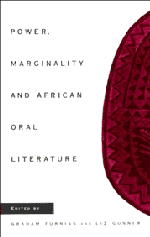Book contents
- Frontmatter
- Contents
- List of contributors
- Preface
- Note on transcription
- 1 Introduction: power, marginality and oral literature
- Part I Orality and the power of the state
- Part II Representing power relations
- Part III Oral forms and the dynamics of power
- 8 Power, marginality and Somali oral poetry: case studies in the dynamics of tradition
- 9 The function of oral art in the regulation of social power in Dyula society
- 10 The power of words and the relation between Hausa genres
- Part IV Endorsing or subverting the paradigms: women and oral forms
- Part V Mediators and communicative strategies
- Bibliography
- Index
10 - The power of words and the relation between Hausa genres
Published online by Cambridge University Press: 18 December 2009
- Frontmatter
- Contents
- List of contributors
- Preface
- Note on transcription
- 1 Introduction: power, marginality and oral literature
- Part I Orality and the power of the state
- Part II Representing power relations
- Part III Oral forms and the dynamics of power
- 8 Power, marginality and Somali oral poetry: case studies in the dynamics of tradition
- 9 The function of oral art in the regulation of social power in Dyula society
- 10 The power of words and the relation between Hausa genres
- Part IV Endorsing or subverting the paradigms: women and oral forms
- Part V Mediators and communicative strategies
- Bibliography
- Index
Summary
The power of the artist manifest in his or her use of language constitutes the focus of this chapter, and this is then set in a wider framework of the relations between different oral and written genres in Hausa seen as representing dominant and marginal cultural forms. While the bulk of the discussion draws on oral genres, I make no apology for moving into discussion of written genres, where questions of self-definition or perceptions of ‘dominant’ and ‘marginal’ require it. I find it difficult to think of ‘the written as against the oral’ as a useful boundary in Hausa where contrast and parallel repeatedly refer one backwards and forwards between genres across this ‘line’.
THE GENRES OF HAUSA LITERATURE/ORATURE
A brief introductory résumé of the genres of Hausa literature/orature is as follows (see also Skinner 1980; Pilaszewicz 1985). A number of prose forms are usually distinguished — among prose narratives labari and tatsuniya contrast as ‘presumed real’ and ‘fictive’ respectively. While the term tatsuniya is predominantly therefore ‘traditional tale’, it is sometimes also used to denote a conundrum or riddle, more often referred to as ka cinci ka cinci, ‘pick up pick up’ which acts both as name conveying the interactive nature of the genre and as introductory formula.
- Type
- Chapter
- Information
- Power, Marginality and African Oral Literature , pp. 130 - 144Publisher: Cambridge University PressPrint publication year: 1995
- 1
- Cited by



